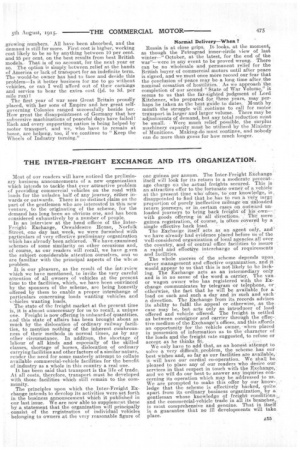THE INTER-FREIGHT EXCHANGE AND ITS ORGANIZATION.
Page 5

If you've noticed an error in this article please click here to report it so we can fix it.
Most of our readers will have noticed the preliminary business announcements of a new organization which intends to tackle that ever attractive problem of providing commercial vehicles on the road with loads for the unladen half of any journey, either inwards or outwards. There is no distinct claim on the part of the gentlemen who are interested in this new venture, to the originating of the scheme, for the demand has long been an obvious one, and has been considered exhaustively by a number of people. In an interview at the head offices of the InterFreight Exchange, Oswaldeaere House, Norfolk Street, one day last week, we were furnished with particulars of very effective preliminary organization which has already been achieved. We have,examined schemes of some similarity on other .occasiens and, of course, as our readers will recall, we have gsen the subject considerable attention ourselves, and so are familiar with the principal aspects of the wlec te problem.
It is our pleasure, as the result of the intrrview which we have mentioned, to invite the very careful attention of all owners of vehicles at the present time to the facilities, which, we have been convinced by the sponsors of the scheme, are being honestly offered by them to enable a proper interchange of particulars concerning loads wanting vehicles and vehicles wanting loads. The state of the freight market at the present time is, it is almost unnecessary for us to recall, a unique one. Freight is now offering in unheard-of quantities, and this state of affairs has been brought about as mtich by the dislocation of ordinary railway facilities, to mention nothing of the inherent cumbrousness of their methods in normal times, as by any other circumstance. In addition, the 'shortage of labour of all kinds and especially of the skilled classes, shortage of horses, dislocation of ordinary carrying facilities and other factors of a similar nature, render the need for some masterly attempt to collate available commercial-vehicle facilities for the benefit of industry as a whole in this country a real one. It has been said that transport is the life of trade. At all costs, therefore, transport must be developed with those facilitieswhich. still remain to the community.
The principles upon which the Inter-Freight Exchange intends to develop its activities were set forth in the business announcement which it published in our last issue. We are now able to supplement these by a statement that the organization will principally consist of the registration of individual vehicles belonging to owners at the very reasonable figure of
one guinea per annum. The Inter-Freight Exchange itself will look for its return to a moderate percent-, age charge on the actual freights secured. This is an attractive offer to the fortunate owner of a vehicle' at the present time whn' often., to our knowledge, is disappointed to find that he has th run a very large' proportion of purely ineffective mileage on unloaded return journeys, or in .certaan cases on outward unloaded journeys to bring bad( freightof his own— with goods offering in all directions. -.' The mere, guinea registration of course, is Often covered by a single effective back lciad. The Exchange itself acts as an agent only, ancl.' we have already had evidence placed before us of the well-considered organization of local agencies all over, the country, and of central office facilities to insure • a rapid and effective interchange of requirements and facilities.
The whole success of the scheme depends upon clever management and effective organization, and it would appear to us that this is not likely to be lacking. The Exchange acts as an intermediary only, and is in no sense of the word a carrier. The van or wagon owner who has registered with the Exchange communicates by telegram or telephone, or, otherwise, the fact that he will be available for a load on such and such a day and in such and such a direction. The Exchange from its records advises its ability to fulfil the appeal or otherwise, as the. case may be, but acts only as introducer of loadoffered and vehicle offered. The freight is settled as between consignor and carrier through the effec-, -five medium of the Exchange's offices, and this affords an opportunity for the vehicle owner, when placed in possession of information as to thecharacter of' the loads and the freight rate suggested, to refuse or accept as he thinks fit. We only have to add that, as an honest attempt to solve a very difficult, problem, the scheme' has our best wishes and, so far as our facilities are available,' it will have our cordial co-operation. We shall be, pleased to place any of our readers who desire our services in that respect in touch with-the Exchange,. and we will do our best to answer any inquiries concerning its operation which may be addressed to us. We are prompted to make this offer by our knowledge that the scheme is effectively backed, quite apart from its ordinary, business organization, by a gentleman whose knowledge of freightconditional_ and the commercial-vehicle trade iiii all its branches,. is most comprehensive and genuine. That in itself is a guarantee that no ill developments will take place.




















